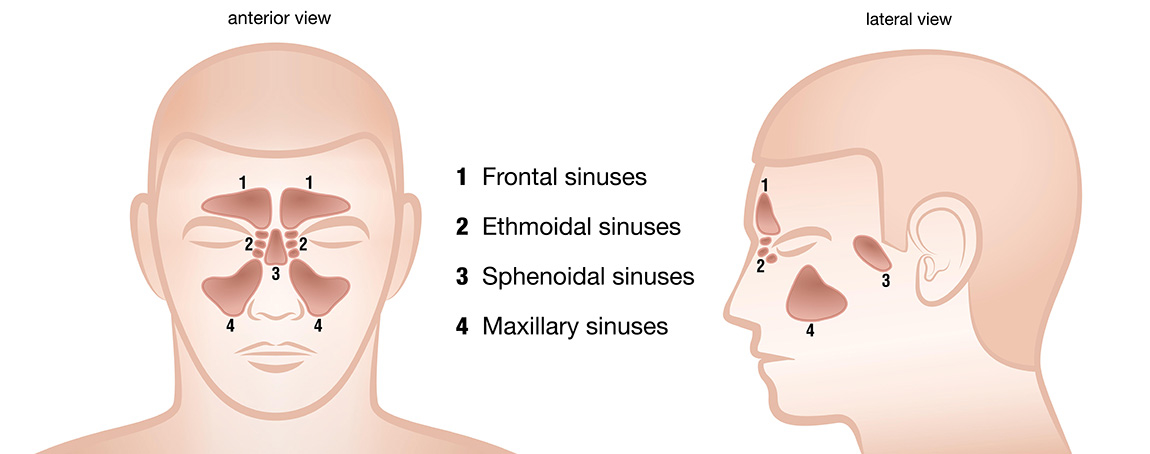Sinusitis (rhinosinusitis)
Key facts
- Sinusitis is an inflammation of the hollow spaces in the skull behind the eyes, nose, forehead and cheeks.
- Symptoms of sinusitis may include a runny or blocked nose, changes in smell and facial pain or pressure — symptoms may worsen when you bend over or spread to your teeth.
- Sinusitis is usually caused by a viral or bacterial infection.
- Your doctor can usually diagnose sinusitis by asking about your symptoms and examining you.
- To help with your sinusitis symptoms, your doctor may recommend or prescribe medicines including regular pain relief, a saline or steroid nasal spray or a nasal decongestant.
What is sinusitis?
Sinusitis is when the hollow spaces behind the eyes, nose, forehead and cheeks become inflamed. Your body can most likely recover without the need for medical treatment. Sinusitis can sometimes be a chronic (long-term) condition, as a complication of allergies or structural problems in the nose.
Sinusitis is also called rhinosinusitis as it causes inflammation of both the nasal passages and sinuses.

What are the symptoms of sinusitis?
Most cases of sinusitis are caused by an infection. If you have acute (short-term) sinusitis caused by a virus, you may have the following symptoms:
- discharge from your nose (a ‘runny nose’) and obstruction (feeling 'stuffy')
- changes in smell
- pain or pressure in your face (you may feel worse when you bend over, or you may feel pressure in your teeth)
Acute bacterial sinusitis has very similar symptoms to acute sinusitis caused by a virus.
If you have sinusitis caused by bacteria, you are more likely to have:
- fever
- pain in your face
- discoloured discharge from your nose
- symptoms that get worse after a mild illness (‘double sickening’)
- symptoms that last more than 10 days without getting better
If you have chronic or long-term (lasting more than 12 weeks) sinusitis, you may have:
- nasal congestion or obstruction (feeling stuffy or blocked)
- change in your ability to smell
- pain and pressure in the face
Sinusitis can also cause a cough and sore throat.
CHECK YOUR SYMPTOMS — Use the Symptom Checker and find out if you need to seek medical help.
What causes sinusitis?
Sinusitis is usually caused by a viral infection, such as the common cold or COVID-19, or by a bacterial infection that develops after a viral infection.
Untreated allergies, having a crooked or bent nose, smoking, polyps in your nose and overuse of decongestant nose sprays can increase your chances of getting sinusitis.
When should I see my doctor?
You should see your doctor if you have symptoms of sinusitis and:
- your symptoms are severe or getting worse
- your symptoms haven't started to improve after around 7 to 10 days
- you have frequent episodes of sinusitis
FIND A HEALTH SERVICE — The Service Finder can help you find doctors, pharmacies, hospitals and other health services.
How is sinusitis diagnosed?
Your doctor can usually diagnose sinusitis by talking to you about your symptoms and by examining you.
Your doctor may refer you for a CT scan or MRI of your sinuses. You will only need this if your doctor thinks you may have complications of sinusitis.
How is sinusitis treated?
Sinusitis usually resolves on its own. Your doctor may prescribe or recommend the following treatments to help manage your symptoms:
- saline nasal sprays, rinses or drops
- nasal decongestants (do not use for more than 3 to 5 days)
- pain relief medicines such as paracetamol and ibuprofen
- steroid nasal spray
- steam inhalation
In some cases, your doctor may prescribe an antibiotic. This is only if your symptoms are severe, taking a long time to get better or if you have complications of sinusitis.
If you often get sinusitis it could be due to an allergy, so they may refer you to an ear, nose and throat (ENT) specialist.
Can sinusitis be prevented?
Sinusitis can be difficult to prevent. You can reduce your chances of developing sinusitis by following good hand washing practices, avoiding cigarette smoke and treating existing problems such as allergies.
What are the complications of sinusitis?
Complications of sinusitis can involve the eye or the brain. Eye complications include infections of the skin around the eye or the eye socket. These are both types of cellulitis.
Complications in the brain include infections such as meningitis or abscesses in different parts of the brain, but this is very rare.
Resources and support
The Australasian Society of Clinical Immunology and Allergy (ASCIA) has information about the symptoms and management of sinusitis — download the ASCIA sinusitis and allergy fact sheet.
Australian Commission on Safety and Quality in Health Care has a decision aid you can use with your doctor to help you decide whether to use antibiotics when you or your child has sinusitis (acute rhinosinusitis).
You can also call the healthdirect helpline on 1800 022 222 (known as NURSE-ON-CALL in Victoria). A registered nurse is available to speak with 24 hours a day, 7 days a week.
Learn more here about the development and quality assurance of healthdirect content.
Last reviewed: May 2025


-537d5d.png)











